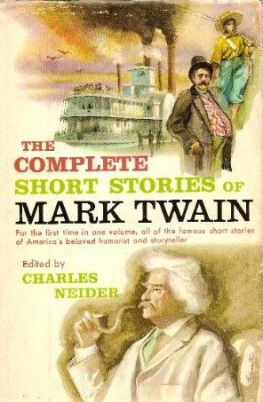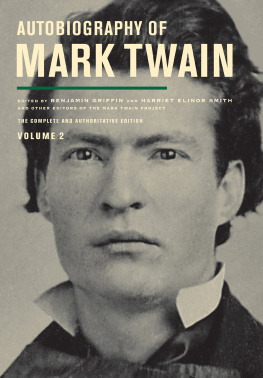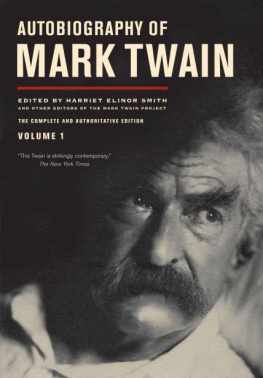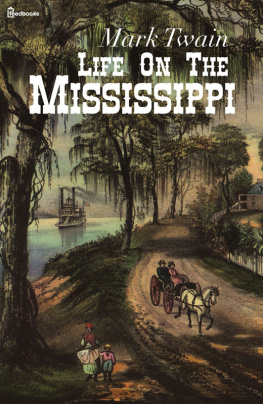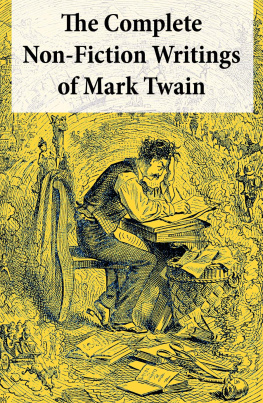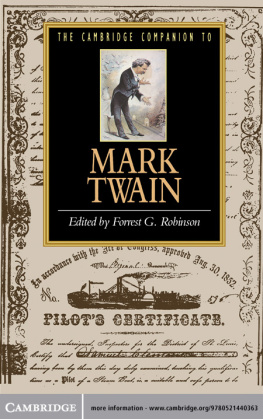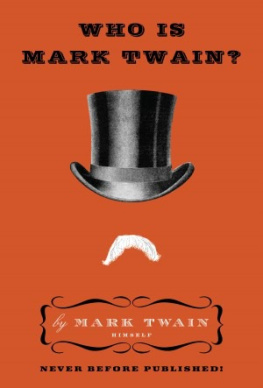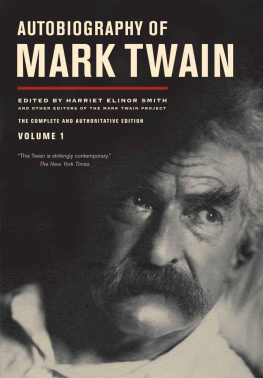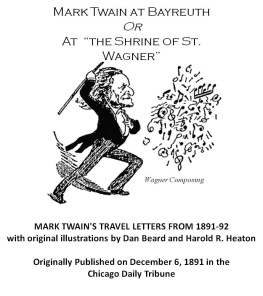Mark Twain - A Double Barrelled Detective Story
Here you can read online Mark Twain - A Double Barrelled Detective Story full text of the book (entire story) in english for free. Download pdf and epub, get meaning, cover and reviews about this ebook. genre: Prose / Detective and thriller. Description of the work, (preface) as well as reviews are available. Best literature library LitArk.com created for fans of good reading and offers a wide selection of genres:
Romance novel
Science fiction
Adventure
Detective
Science
History
Home and family
Prose
Art
Politics
Computer
Non-fiction
Religion
Business
Children
Humor
Choose a favorite category and find really read worthwhile books. Enjoy immersion in the world of imagination, feel the emotions of the characters or learn something new for yourself, make an fascinating discovery.

- Book:A Double Barrelled Detective Story
- Author:
- Genre:
- Rating:5 / 5
- Favourites:Add to favourites
- Your mark:
- 100
- 1
- 2
- 3
- 4
- 5
A Double Barrelled Detective Story: summary, description and annotation
We offer to read an annotation, description, summary or preface (depends on what the author of the book "A Double Barrelled Detective Story" wrote himself). If you haven't found the necessary information about the book — write in the comments, we will try to find it.
A Double Barrelled Detective Story — read online for free the complete book (whole text) full work
Below is the text of the book, divided by pages. System saving the place of the last page read, allows you to conveniently read the book "A Double Barrelled Detective Story" online for free, without having to search again every time where you left off. Put a bookmark, and you can go to the page where you finished reading at any time.
Font size:
Interval:
Bookmark:
A DOUBLE BARRELLED DETECTIVE STORY
By Mark Twain
PART I
"We ought never to do wrong when people are looking."
I
The first scene is in the country, in Virginia; the time, 1880. There has been a wedding, between a handsome young man of slender means and a rich young girla case of love at first sight and a precipitate marriage; a marriage bitterly opposed by the girl's widowed father.
Jacob Fuller, the bridegroom, is twenty-six years old, is of an old but unconsidered family which had by compulsion emigrated from Sedgemoor, and for King James's purse's profit, so everybody saidsome maliciously the rest merely because they believed it. The bride is nineteen and beautiful. She is intense, high-strung, romantic, immeasurably proud of her Cavalier blood, and passionate in her love for her young husband. For its sake she braved her father's displeasure, endured his reproaches, listened with loyalty unshaken to his warning predictions, and went from his house without his blessing, proud and happy in the proofs she was thus giving of the quality of the affection which had made its home in her heart.
The morning after the marriage there was a sad surprise for her. Her husband put aside her proffered caresses, and said:
"Sit down. I have something to say to you. I loved you. That was before I asked your father to give you to me. His refusal is not my grievanceI could have endured that. But the things he said of me to youthat is a different matter. Thereyou needn't speak; I know quite well what they were; I got them from authentic sources. Among other things he said that my character was written in my face; that I was treacherous, a dissembler, a coward, and a brute without sense of pity or compassion: the 'Sedgemoor trade-mark,' he called itand 'white-sleeve badge.' Any other man in my place would have gone to his house and shot him down like a dog. I wanted to do it, and was minded to do it, but a better thought came to me: to put him to shame; to break his heart; to kill him by inches. How to do it? Through my treatment of you, his idol! I would marry you; and thenHave patience. You will see."
From that moment onward, for three months, the young wife suffered all the humiliations, all the insults, all the miseries that the diligent and inventive mind of the husband could contrive, save physical injuries only. Her strong pride stood by her, and she kept the secret of her troubles. Now and then the husband said, "Why don't you go to your father and tell him?" Then he invented new tortures, applied them, and asked again. She always answered, "He shall never know by my mouth," and taunted him with his origin; said she was the lawful slave of a scion of slaves, and must obey, and wouldup to that point, but no further; he could kill her if he liked, but he could not break her; it was not in the Sedgemoor breed to do it. At the end of the three months he said, with a dark significance in his manner, "I have tried all things but one"and waited for her reply. "Try that," she said, and curled her lip in mockery.
That night he rose at midnight and put on his clothes, then said to her,
"Get up and dress!"
She obeyedas always, without a word. He led her half a mile from the house, and proceeded to lash her to a tree by the side of the public road; and succeeded, she screaming and struggling. He gagged her then, struck her across the face with his cowhide, and set his bloodhounds on her. They tore the clothes off her, and she was naked. He called the dogs off, and said:
"You will be foundby the passing public. They will be dropping along about three hours from now, and will spread the newsdo you hear? Good-by. You have seen the last of me."
He went away then. She moaned to herself:
"I shall bear a childto him! God grant it may be a boy!"
The farmers released her by-and-byand spread the news, which was natural. They raised the country with lynching intentions, but the bird had flown. The young wife shut herself up in her father's house; he shut himself up with her, and thenceforth would see no one. His pride was broken, and his heart; so he wasted away, day by day, and even his daughter rejoiced when death relieved him.
Then she sold the estate and disappeared.
II
In 1886 a young woman was living in a modest house near a secluded New England village, with no company but a little boy about five years old. She did her own work, she discouraged acquaintanceships, and had none. The butcher, the baker, and the others that served her could tell the villagers nothing about her further than that her name was Stillman, and that she called the child Archy. Whence she came they had not been able to find out, but they said she talked like a Southerner. The child had no playmates and no comrade, and no teacher but the mother. She taught him diligently and intelligently, and was satisfied with the resultseven a little proud of them. One day Archy said,
"Mamma, am I different from other children?"
"Well, I suppose not. Why?"
"There was a child going along out there and asked me if the postman had been by and I said yes, and she said how long since I saw him and I said I hadn't seen him at all, and she said how did I know he'd been by, then, and I said because I smelt his track on the sidewalk, and she said I was a dum fool and made a mouth at me. What did she do that for?"
The young woman turned white, and said to herself, "It's a birthmark! The gift of the bloodhound is in him." She snatched the boy to her breast and hugged him passionately, saying, "God has appointed the way!" Her eyes were burning with a fierce light, and her breath came short and quick with excitement. She said to herself: "The puzzle is solved now; many a time it has been a mystery to me, the impossible things the child has done in the dark, but it is all clear to me now."
She set him in his small chair, and said,
"Wait a little till I come, dear; then we will talk about the matter."
She went up to her room and took from her dressing-table several small articles and put them out of sight: a nail-file on the floor under the bed; a pair of nail-scissors under the bureau; a small ivory paper-knife under the wardrobe. Then she returned, and said,
"There! I have left some things which I ought to have brought down." She named them, and said, "Run up and bring them, dear."
The child hurried away on his errand and was soon back again with the things.
"Did you have any difficulty, dear?"
"No, mamma; I only went where you went."
During his absence she had stepped to the bookcase, taken several books from the bottom shelf, opened each, passed her hand over a page, noting its number in her memory, then restored them to their places. Now she said:
"I have been doing something while you have been gone, Archy. Do you think you can find out what it was?"
The boy went to the bookcase and got out the books that had been touched, and opened them at the pages which had been stroked.
The mother took him in her lap, and said,
"I will answer your question now, dear. I have found out that in one way you are quite different from other people. You can see in the dark, you can smell what other people cannot, you have the talents of a bloodhound. They are good and valuable things to have, but you must keep the matter a secret. If people found it out, they would speak of you as an odd child, a strange child, and children would be disagreeable to you, and give you nicknames. In this world one must be like everybody else if he doesn't want to provoke scorn or envy or jealousy. It is a great and fine distinction which has been born to you, and I am glad; but you will keep it a secret, for mamma's sake, won't you?"
Font size:
Interval:
Bookmark:
Similar books «A Double Barrelled Detective Story»
Look at similar books to A Double Barrelled Detective Story. We have selected literature similar in name and meaning in the hope of providing readers with more options to find new, interesting, not yet read works.
Discussion, reviews of the book A Double Barrelled Detective Story and just readers' own opinions. Leave your comments, write what you think about the work, its meaning or the main characters. Specify what exactly you liked and what you didn't like, and why you think so.

